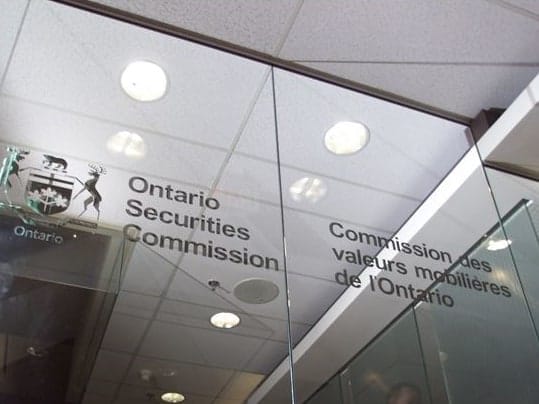
 After receiving several complaints, the Ontario Securities Commission says it is now investigating a number of cryptocurrency trading platforms to see whether they fall under the commission’s purview regarding securities law.
After receiving several complaints, the Ontario Securities Commission says it is now investigating a number of cryptocurrency trading platforms to see whether they fall under the commission’s purview regarding securities law.
That decision will be pivotal to the newly opened up cryptocurrency and blockchain space in Canada, says Daniel Fuke, partner at business law firm Fasken and counsel for the Canadian cryptocurrency exchange Coinsquare.
The OSC made the announcement last Friday, saying that it would look into whether cryptocurrency exchange platforms qualify as marketplaces and thereby should be held to the commission’s regulatory standards.
“We are aware of several cryptocurrency trading platforms operating in Ontario and are gathering information about their activities. To date, none have been recognized as an exchange, or exempted from recognition,” said Kristen Rose, spokesperson for the commission, to the Toronto Star.
Up until now, no decision has been made on the designation issue, even as cryptocurrency exchanges and so-called initial coin offerings (ICOs) continue to flourish, raising concerns over the potential for investor fraud.
Fuke says a lot rests on such a decision.
“The implications of that are enormous,” says Fuke, in conversation with BNN. “If a particular currency or coin or token is a security, then you have to comply with all securities laws from beginning to end. If it’s not, then securities laws can’t touch it, but at the same time, that’d be really frustrating for the OSC because they’ve got this investor protection mandate but no ammunition with which to implement it.”
Fuke explains that the problem stems from the dual nature of some cryptocurrencies which operate not only as mediums of exchange but also as blockchain-based tools for creating incorruptible digital ledgers that have an array of potential uses which go beyond those typically ascribed to securities.
“Bitcoin has so far worked as a store of value and as a medium of exchange, like a true currency. But then the second-most well known is ether, which in addition to its store of value property it’s incredibly useful for blockchain companies developing apps because it allows you to develop smart contracts on top of it and thereby to develop your own blockchain solutions,” says Fuke.
“So, you’ve got this asset which is a store of value but which is also so functional that it really doesn’t resemble a common share, so it’s difficult for people in the industry to see why rules that apply to common shares would also apply to ether,” he says.
The OSC’s stated aim is to protect investors from unfair or fraudulent practices, along with contributing to the efficient operation of capital markets. But whether or how that mandate will cover cryptocurrencies is still unclear.
The prospect of the OSC’s officially exempting such platforms from its purview is itself a problematic solution, says Fuke. “To some people, [exemptive relief] is a really imperfect solution because in order to get exemptive relief, you’re acknowledging that securities laws apply and therefore that the OSC has got you within its grasp, and you may think that that’s not appropriate,” he said.
Leave a Reply
You must be logged in to post a comment.




 Share
Share Tweet
Tweet Share
Share




Comment